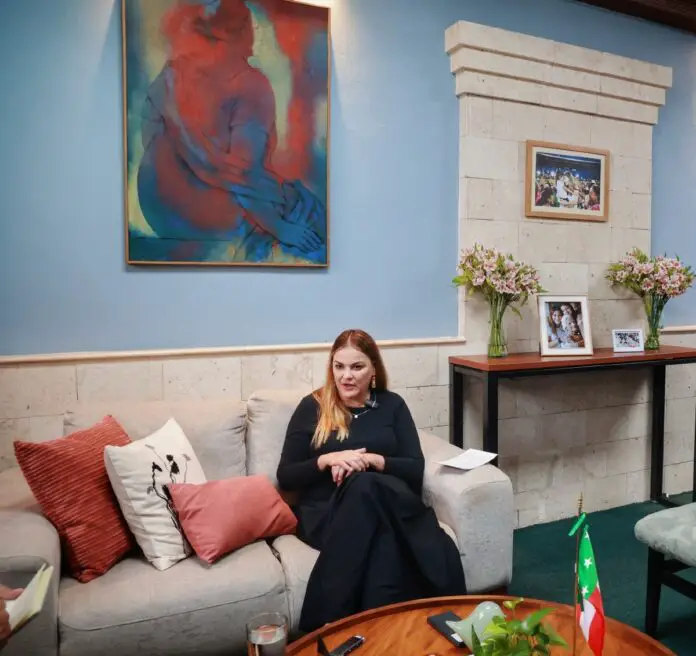Mayor Cecilia Patrón Laviada has acknowledged that the state of the streets is one of the most significant challenges facing her administration.
Street Maintenance and Repairs
“When we arrived at City Hall, we found deteriorated streets, especially after the atypical rains in October. More than 60% of the roads are over 40 years old, which explains part of the problem,” she said. Additionally, companies like cable and gas providers have opened streets without properly repairing them, which will no longer be tolerated. The Urban Development Directorate has been instructed to ensure streets are returned to their original condition.
Thanks to a saving of 150 million pesos in the first months of her administration, streets in more than 23 neighborhoods, including Amalia Solórzano, Lázaro Cárdenas, Dolores Otero, Juan Pablo II, Sodzil, and the Historic Center, are being addressed. “We work throughout the city: in the south, north, east, west, and in the police stations. This effort is complemented by a modification to the Construction Regulations, requiring greater thickness in the streets of new developments,” she explained. Maintenance is planned to be carried out before the rainy season.
Drainage and Flood Prevention
Another priority is cleaning drainage systems and maintaining storm drains, especially in the Historic Center, which faces recurring flooding problems. “We acquired equipment that is already working on cleaning wells and sewers. We allocated a special project for the Historic Center, where the College of Civil Engineers supports us with technical solutions for water problems in the area,” she commented.
Budget Allocation
“Citizens ask us for better streets, better lighting, clean parks, and an efficient drainage system. That is our responsibility as City Hall, and we are investing more than 60% of the budget to address these needs. You can count on us to continue working 24/7 to improve the quality of life in Mérida,” said the mayor.
Social Justice and Public Services
Cecilia Patrón emphasized that social justice is a cross-cutting axis in all municipal programs, focused on reducing inequalities between different areas of the city. “We seek that all parks, streets, and public spaces have the same quality, regardless of whether they are in the north, south, center, or east. Social justice means that all citizens deserve to live in an equal city with opportunities,” she said.
Education and Support Programs
The mayor highlighted scholarships of excellence given to more than 700 young people with averages of 9 or more, from both public and private schools. “We increased the amount of scholarships for primary and secondary school by 20%, because we understand that education is key to the development of people. We cannot think of a change if we do not invest in education,” she said.
Programs such as My First Credit, Microcredits, and Woman to Woman, aimed at entrepreneurs, were also highlighted. “As a woman, I have a great commitment to the women of Mérida. We increased the budget of the Women’s Institute by 18% to strengthen legal and psychological care and launch campaigns against teenage pregnancy. Women are not alone,” she said.
Mental Health and Healthcare
Mental health is another priority issue. “That is why we inaugurated a second Alma Nova Center in the west of the city, in addition to the one in the south, to provide free psychological care to children, young people, and adults,” she said. Programs like Doctor at Home, which serves bedridden and pregnant people, and the mobile mammogram, which has allowed early detection of cancer cases in women, were also emphasized.
Commitment to the Elderly
The mayor expressed her commitment to the elderly, who are a fundamental pillar for the city. “We have programs like Enchula tu Casa, where we improve the homes of the elderly, many of whom do not have the strength or resources to do so. We have also inaugurated 10 day clubs and two large centers, Renacer and Armonía, in the east and west of Mérida, where the elderly can live together, learn, and enjoy recreational activities,” she said.
Environmental Initiatives
On the environmental front, the creation of the Environment and Animal Welfare Unit promotes projects like green corridors and recycling programs. “We are working to make Mérida greener. That is why all public works projects must include at least 40% green areas. We are promoting the protection of historic trees and carrying out clean-up campaigns in the city,” she said.
Cultural and Citizen Participation
The importance of culture and citizen participation as drivers of unity and development was also stressed. “Mérida is a cultural city par excellence. We have free events every day of the year, such as the Festival de las Ánimas, the Mérida Fest, and the Noches Blancas. Additionally, we promote citizen participation with programs like Vecino Vigilante and public consultations, because we believe that together we can build a better city,” she said.
Focus on Childhood
Mayor Patrón emphasized that true transformations begin in childhood. “We create ludotecas, build parks, and promote development spaces for our children. We also provide hot school breakfasts because we know that good nutrition from childhood is key to physical and neurological development. Investing in the youngest is investing in a better future for everyone,” she said.
Animal Welfare
The mayor also highlighted actions in animal welfare, such as the sterilization and rescue of mistreated animals, carried out in coordination with the Municipal Police.
With these actions, the Mérida City Council strengthens public services and ensures that the city continues to be an example at the national level in quality of life and security.
Source: Diario de Yucatan




